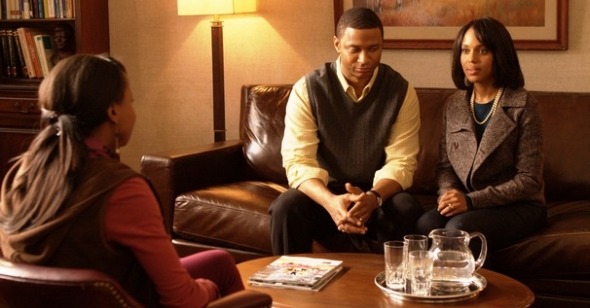From the Heart
by Michael Koresky
Mother and Child
Dir. Rodrigo Garcia, U.S., Sony Pictures Classics
In his 2005 film Nine Lives, Rodrigo Garcia did something cinematically unexpected. Bringing to the women’s picture a rigorous aesthetic design, Nine Lives, made up of nine disparate segments about different female characters shot in elaborate single takes, successfully translated the structure of a short story anthology to the screen, and without denying film’s unique properties. The narratives themselves, surveying women from different classes and pasts and at different life thresholds, may not have been equally gripping, but together the film had a cumulative power, while certain segments (especially Robin Wright Penn’s supermarket encounter with an ex-flame) could be considered short-film classics. In his new film, Mother and Child, Garcia continues his mission to dramatize intersecting lives of women, yet here his three main characters are figures in a single, elegantly unfolding narrative. While not without its stilted moments and easy sentiments, Mother and Child is lucid, engaging, and novelistic in the best sense—even if it could have used that little extra aesthetic push that made Nine Lives so remarkable.
At this point, Garcia’s adoration of women can’t be mistaken, but it could be taken for granted. Even the title of this film begs to give mother-daughter relations iconic, mythic status. And though it can easily be argued that his idolization, even idealization, of femininity, motherhood, and female empowerment might cross the line into fetish, with his unerring focus on issues of birth and adoption, the result is genuinely warm, from the heart, and emotionally honest even as it twists itself into narrative pretzels. It also provides meaty roles for three actresses: Naomi Watts, Annette Bening, and Kerry Washington.
After beginning with impressionistic, fleeting images of a teenage girl’s life—from pregnancy to giving birth to making the decision to put her baby up for adoption—the film introduces us to Watts’s Elizabeth, an icy, driven 37-year-old lawyer who’s almost pathologically independent, making no time for lovers or even close female friends (“I’m not in the sisterhood,” she tells her boss); at the same there’s Bening’s Karen, an emotionally closed physical therapist in her early fifties, taking care of a dying mother she feels she doesn’t know. Rounding out the film’s triumvirate is Washington’s Lucy, a modestly successful baker in her twenties who’s desperate for a baby with her husband and turns to adoption when she discovers she cannot have one of her own.
It’s unspoken but it become relatively clear soon enough that Elizabeth, who speaks of being abandoned at birth by a teenage mother she never met, is Karen’s daughter. Yet Garcia’s ruminative narrative circles gingerly around this topic for a long while, instead letting us get to know these women before their lives inevitably re-intersect—which happens in wholly surprising, well plotted, and emotionally satisfying ways. Washington’s fateful significance in all this also makes itself evident bit by bit; especially in the way Garcia masterfully presents her search for a child as a touching parallel narrative in its own right.
In fact, Washington is the revelation of the film. While Watts brings transparency and complexity to a potentially difficult role (as written, Elizabeth is at times too cartoonishly malignant), and subtlety has never been Bening’s strong suit (whatever Karen’s emotions—cruelty, joy—Bening lays it on thick as spackle), Washington rarely hits a false note, moving effortlessly from charming neuroticism to professional confidence to tearful desperation.
The gamut of emotions Washington runs is indicative of the film as a whole, which never shies away from big, sentimental sweep, yet also somehow doesn't tip over into cheeky melodrama. And though the film could not be called visually daring by any stretch of the imagination, Garcia here and there makes room for expertly crafted little grace notes, the most luminous of which is a late-film single take of Bening simply walking out her front door and down the street to a neighbor’s house: it sounds mundane, but coming where it does in the film, it’s anything but. Garcia brings dignity and lyricism back to a genre that all too frequently devolves into histrionics.
A version of this article originally appeared on indieWIRE.com..
